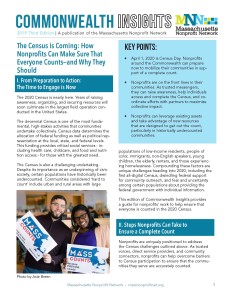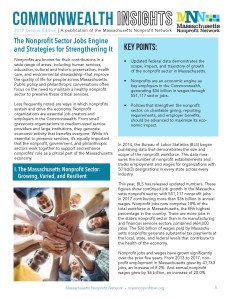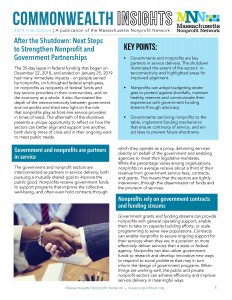MNN’s Commonwealth Insights publications highlight policy, issues, and trends important to the nonprofit sector. In each edition, we’ll feature data and stories that illustrate the full depth and breadth of the nonprofit sector in Massachusetts.
2019 Third Edition
The Census is Coming: How Nonprofits Can Make Sure That Everyone Counts–and Why They Should
The 2020 Census is nearly here. It is one of the most foundational, high-stakes activities that communities undertake collectively. Census data determines the allocation of billions of dollars in federal funding to Massachusetts annually, as well as political representation at the local, state, and federal levels.
Despite its importance as an underpinning of civic society, the 2020 Census faces unique challenges: the first all-digital Census, dwindling federal support for community reach, and fear and uncertainty among certain populations about providing the federal government with individual information.
This edition of Commonwealth Insights is a practical, easy-to-use guide for nonprofits to help ensure that everyone is counted in the 2020 Census.
The key points are:
- April 1, 2020 is Census Day. Nonprofits around the Commonwealth can prepare now to mobilize their communities in support of a complete count.
- Nonprofits are on the front lines of their communities. As trusted messengers, they can raise awareness, help individuals access and complete the Census, and coordinate efforts with partners to maximize collective impact.
- Nonprofits can leverage existing assets and take advantage of new resources that are designed to get out the count, particularly in historically under-counted communities.
2019 Second Edition
The Nonprofit Sector Jobs Engine and Strategies for Strengthening It
Nonprofits are known for their contributions in a wide range of areas–including human services, education, cultural and historic preservation, health care, and environmental stewardship–that improve the quality of life for people across Massachusetts. Public policy and philanthropic conversations often focus on the need to maintain a healthy nonprofit sector to preserve those critical services.
Less frequently noted are ways in which nonprofits sustain and drive the economy. Nonprofit organizations are essential job creators and employers in the Commonwealth. From small grassroots organizations to medium-sized service providers and large institutions, they generate economic activity that benefits everyone. While it’s essential to preserve services, it’s equally important that the nonprofit, government, and philanthropic sectors work together to support and enhance nonprofits’ role as a critical part of the Massachusetts economy.
The key points are:
- Updated federal data demonstrates the scope, impact, and trajectory of growth of the nonprofit sector in Massachusetts.
- Nonprofits are an economic engine as key employers in the Commonwealth, generating $36 billion in wages through 551,117 sector jobs.
- Policies that strengthen the nonprofit sector, on charitable giving, reporting requirements, and employer benefits, should be advanced to maximize its economic impact.
2019 First Edition
After the Shutdown: Next Steps to Strengthen Nonprofit and Government Partnerships
The 35-day lapse in federal funding that began on December 22, 2018, and ended on January 25, 2019 had many immediate impacts – on people served by nonprofits, on furloughed federal employees, on nonprofits as recipients of federal funds and key service providers in their communities, and on the economy as a whole. It also illuminated the depth of the interconnectivity between government and nonprofits, and shed new light on the role that nonprofits play as front-line service providers in times of need.
The first edition of Commonwealth Insights in 2019 uses the aftermath of the shutdown as a unique opportunity to reflect on how the sectors can better align and support one another, both during times of crisis and in their ongoing work to meet public needs.
The key points are:
- Government and nonprofits are key partners in service delivery. The shutdown illuminated the extent of the sectors’ interconnectivity and highlighted areas for improved alignment.
- Nonprofits can adopt budgeting strategies to protect against shortfalls, maintain healthy reserves and communicate their experience with government funding streams through advocacy.
- Governments can bring nonprofits to the table, implement funding mechanisms that ensure the continuity of service, and enact laws to prevent future shutdowns.



